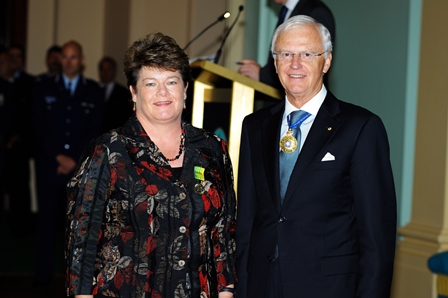Guest Speaker Sue Williams "Restructuring Sri Lanka and the Maldives after the 2004 tsunami"
At its Dinner meeting on 3rd December 2012, Rotarian, John Clue, introduced guest speaker, Sue Williams, who was part of a Victorian Government team that assisted in Sri Lanka and the Maldives after the devastating tsunami that struck the region in December 2004.
Sue Williams - "Restructuring Sri Lankan and the Maldives after the tsunami"
 In opening, John Clue, introduced Sue Williams who is the daughter of honorary Rotarian, Rae Williams and former Rotarian John Williams (dec). She was part of an Victorian Government team that assisted in Sri Lanka and the Maldives after the devastating tsunami that struck the region in December 2004.
In opening, John Clue, introduced Sue Williams who is the daughter of honorary Rotarian, Rae Williams and former Rotarian John Williams (dec). She was part of an Victorian Government team that assisted in Sri Lanka and the Maldives after the devastating tsunami that struck the region in December 2004.
In April 2012, Sue was awarded a Public Service Medal by the Governor of Victoria, The Honourable Alex Chernov AC, QC (pictured at left) "For outstanding public service to Tsunami Reconstruction in Sri Lanka and the Maldives."
Sue, who is currently the Manager, for International Aid Development (Security and Emergency Management Branch) in the Department of Premier & Cabinet for the Victorian Government, spoke on her experiences in helping the rehabilitation of disaster areas after the 2004 tsunami that struck the region off Indonesia just after 8am on Boxing Day.
The tsunami killed more people than any other in recorded history with over 227,000 displaced persons in the region. The Maldives alone had 21,600 displaced persons during the disaster.
The Victorian Government of the day, led then by Premier, Steve Bracks, immediately donated $1.5M via Australian relief agencies. The funds went towards rehabilitation services in affected areas, particularly the Maldives and Sri Lanka, with the disbursement and associated relief effort being coordinated by Sue from the Premier’s Office. Sue, who also had to oversee the streamlining of donations from business and community groups to ensure that funds were disbursed in an efficient manner also highlighted the role of Rotary in the relief effort.
Other areas of involvement by the State of Victoria included the Victorian Police who helped with identification of bodies in Thailand and various other health and teaching professionals.
In January 2005 the Bracks Government established a $10M fund to assist reconstruction in affected areas. This fund was managed by the Office of the Department of Premier & Cabinet with allocations being approved by Premier Bracks.
The following initiatives were established to oversee the project.
Framework:
The following framework was established:
Considerations:
Sue then gave an overview of some of the projects undertaken in the Maldives and Sri Lanka.
Projects:
Maldives:
Sri Lanka:
Complexities:
Some of the complexities that had to be overcome or considered during the aid period were –
Reflections:
Reflections by Sue (What I knew then to what I know now!)
Finally, Sue spoke of the Australian Civilian Corps that was established by AusAID after the tsunami, of which she is a member.
The ACC brings together experienced, mature people with specialist skills that bridge the gap between Emergency Humanitarian Response and Long Term Development Assistance.
In closing Sue showed video portraying images from both the Maldives and Sri Lanka garnered from 18 trips to Sri Lanka and 2 to the Maldives.John Clue presented Sue with a small gift in appreciation of her talk and thanked her for her involvement in the meeting.
